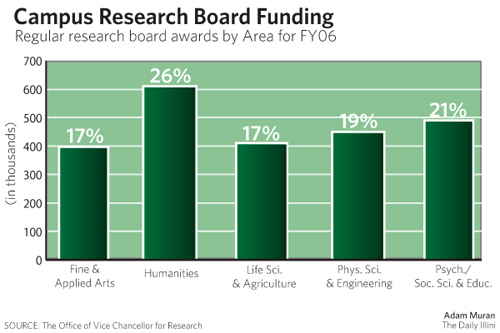Research Board faces possible cut in funding

ME Online
April 5, 2007
Campus Research Board grants are important to faculty looking to travel, hire research assistants, purchase equipment, and publish the books necessary to gain tenure at the University. In fact, the grants are essential to faculty in the humanities and Fine and Applied Arts, where minimal external funding is available.
Endowments and institutional funding provide the support for the Research Board, said Charles Zukoski, vice chancellor for research, and the money to sustain it at its current level is simply not coming in. He said his office has been sustaining the board grants by digging into its reserves and that now the reserves are out.
This lack of funding may result in the reduction or restructuring of the Campus Research Board, Zukoski said. He expects to make a decision about changes to the Research Board by July. A Faculty Senate-appointed Research Policy Committee is working to set priorities for allocating the funds.
“Nothing exactly is predetermined here but that I have to reduce my budget,” Zukoski said.
An increase in other costs has also reduced Research Board funding. Some of the money goes to making sure research is conducted in a healthy, humane and environmentally sound manner. Zukoski said federal and state government regulations in regard to these factors have increased in cost. In addition, some of the money also goes to start-up packages for faculty in Engineering and the physical sciences, which have also increased in cost.
Get The Daily Illini in your inbox!
Some faculty members are concerned that the Research Board will lose all of its funding.
“It’s the single thing the University could do that would largely destroy the humanities on this campus,” said Cary Nelson, professor of English at the University and national president of the American Association of University Professors. “It would reduce research funding to the level of a community college, and we would be the research university in the country with the lowest level of research funding for the humanities.”
Nelson added that eliminating the Research Board would lead faculty in the humanities to look for work elsewhere.
“I think it would be a terrible mistake,” said Vernon Burton, chair of the Illinois Senate Executive Committee. “But I don’t think it is something that is going to happen.”
Zukoski said he does not expect to reduce funding to zero, and he knows how important grants are to faculty in the humanities and in Fine and Applied Arts.
Howard Guenther, associate vice chancellor for research, said the average Research Board grant is $10,500, and the maximum grant is $25,000. In the 2006 fiscal year, the board awarded 230 grants. Generally, the board distributes the grants relatively equally among five disciplined categories: Fine and Applied Arts; humanities; life sciences and agriculture; physical sciences and Engineering; and psychology, the social sciences and education.
Zukoski and Guenther said 52 percent of Research Board funds go to the humanities through these grants, the Humanities Released Time Program and the Scholars’ Travel Fund.
Nelson said faculty members often share their research with their students, many times the semester after they complete it. As a result, students have access to current information.
“To cut off that source of information from our students would be unconscionable,” Nelson said.
James P. Warfield, professor of architecture, said the Research Board awarded him eleven grants over the course of his 30-year teaching career.
The grants allowed him to research vernacular architecture around the world, which helped him receive external funding for additional research.
Warfield said the grants he received from the Research Board led him to develop a deep loyalty to the University.
“The faculty are the long-term investment that the University has,” Warfield said. “I think that the Research Board is simply a way of fostering that and retaining that investment.”






